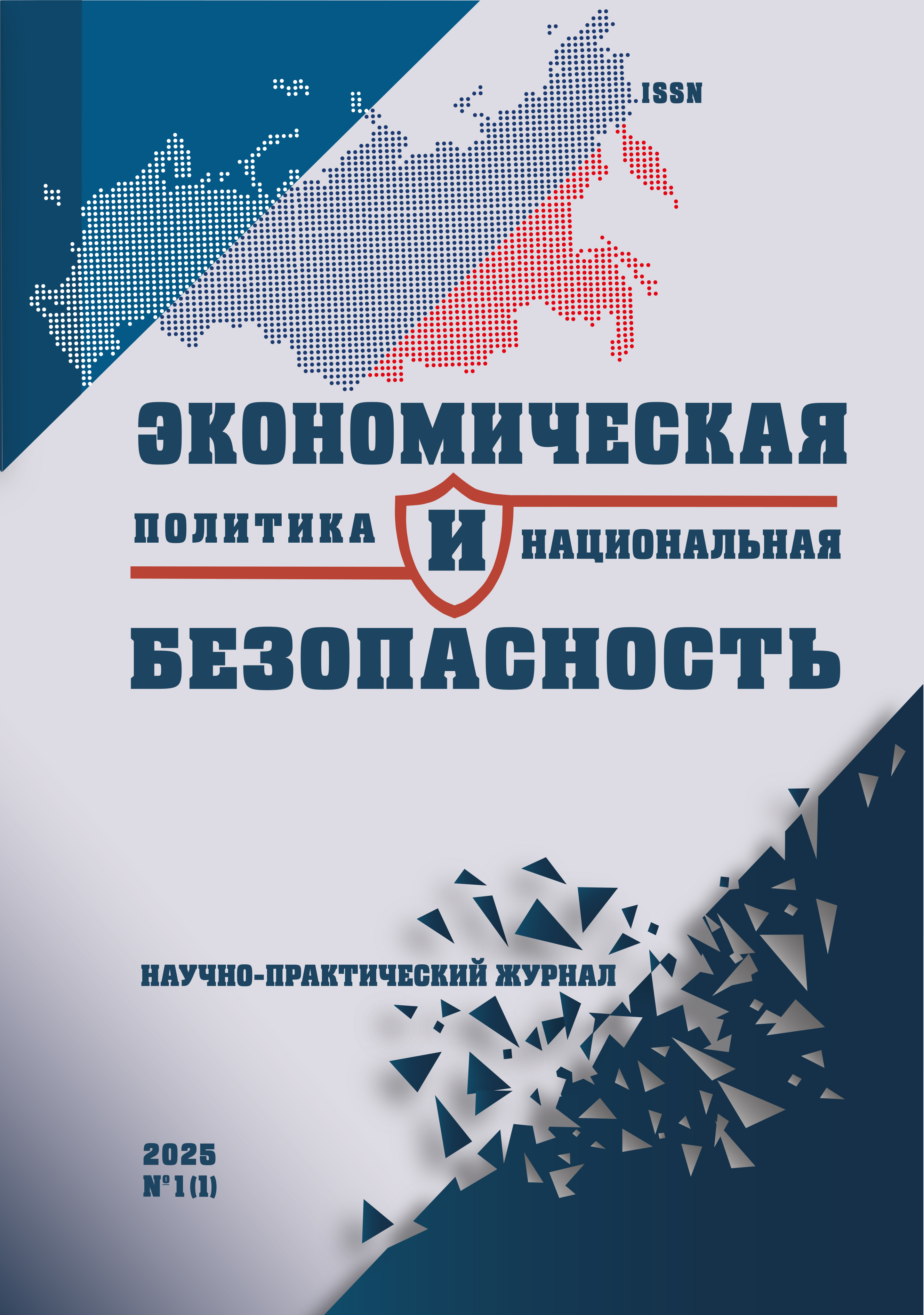Russian Federation
Russian Federation
Introduction. The development of financial technologies and the increase in the digitalisation of the economic space have led to a sharp rise in cybercrime. The presence of gaps in legislation negatively affects the effectiveness of proactive and adaptive strategies to counteract such crimes. These trends also contribute to the growth of the shadow economy and tax evasion, which adversely impacts the level of economic security in the country. Methods. The methodological basis of the study consisted of comparative and retrospective methods. This approach made it possible to identify the specifics of cybercrimes and determine the key directions of countering them by using artificial intelligence technologies. Results. Ensuring an acceptable level of security for the financial system requires the adoption of a comprehensive strategy based on the use of advanced artificial intelligence and big data technologies. Enhancing the effectiveness of interaction between the state and businesses in identifying and preventing crimes in the financial sphere will ensure the sustainable development of the country’s economic system and improve the level of economic security. Expanding international cooperation is a key factor in combating transnational financial crimes, as it complicates the use of complex schemes designed to circumvent anti-money laundering measures.
cybercrime, artificial intelligence, financial crimes, financial fraud, financial technologies, digital financial technologies, big data, financial security, economic security
1. Vasyukov, Vitaly F., and Anna N. Starzhinskaya. 2024. “Ob operativno-rozysknykh i sledstvennykh merakh protivodeystviya legalizatsii prestupnykh dokhodov s ispol'zovaniyem kriptovalyut” [“On operationalsearch and investigative measures to counter money laundering using cryptocurrencies”] (In Russ.). Rossijskoe pravo: obrazovanie, praktika, nauka [Russian law: education, practice, science], no. 4: 68–78. https://doi.org/10.34076/2410-2709-2024-142-4-68-78
2. Lapshin, Valeriy F. 2011. “Finansovyye prestupleniya v strukture ekonomicheskikh ugolovno nakazuyemykh posyagatel'stv” [“Financial crimes in the structure of economic criminal offenses”] (In Russ.). Penitenciarnaya nauka [Penitentiary science], no. 16: 9–13.
3. Reshetov, Konstantin Y., K. V. Funtikova, D. K. Dyachkova. 2024. “Vliyaniye iskusstvennogo intellekta na transformatsiyu mirovoy finansovoy sistemy” [“The influence of artificial intelligence on the transformation of the global financial system”] (In Russ.). E`konomika i predprinimatel`stvo [Economics and entrepreneurship] 162, no. 1: 452–8. https://doi.org/10.34925/EIP.2024.162.1.084
4. Savin, Sergei V., and Anton D. Murzin. 2024. “Sistemy podderzhki prinyatiya resheniy na baze iskusstvennogo intellekta: integratsiya, adaptatsiya i otsenka effektivnosti” [“Decision support systems based on artificial intelligence: integration, adaptation and effectiveness assessment”] (In Russ.). Ekonomika i upravlenie [Economics and management] 30, no. 12: 1521–34. https://doi.org/10.35854/1998-1627-2024-12-1521-1534
5. Sviridov, Oleg Yu., and Inna V. Nekrasova. 2019. “Tendentsii razvitiya fintekh-ekosistemy v rossiyskoy ekonomike” [“Trends in the development of the fintech ecosystem in the Russian economy”] (In Russ.). Vestnik volgogradskogo gosudarstvennogo universiteta. Ekonomika [Bulletin of the Volgograd State University. Economy] 21, no. 4: 197–206.
6. Khabibulin, Alik G. et al. 2024. “Aktual'nyye problemy formirovaniya znaniy dlya podgotovki spetsialistovyuristov v sfere obespecheniya ekonomicheskoy i finansovoy bezopasnosti, zashchity finansovogo suvereniteta Rossiyskoy Federatsii v usloviyakh transformatsii miroporyadka” [“Actual problems of knowledge formation for the training of legal specialists in the field of ensuring economic and financial security, protecting the financial sovereignty of the Russian Federation in the context of the transformation of the world order”] (In Russ.). Vestnik Moskovskogo universiteta. Seriya 26: Gosudarstvenny`j audit [Bulletin of the Moscow University], 4: 27–52. https://doi.org/10.55959/MSU2413-631X-27-15-4-03
7. Eskindarov, Mikhail A. et al. 2018. “Napravleniya razvitiya fintekha v Rossii: ekspertnoye mneniye Finansovogo universiteta” [“The direction of business development in Russia: the analyst's expert opinion”] (In Russ.). Mir novoj ekonomiki [The world of new information] 12, no. 2: 6–23. https://doi.org/10.26794/2220-6469-2018-12-2-6-23
8. AL-Dosari, Khalifa, Noora Fetais, and Murat Kucukvar. 2022. “Artificial intelligence and cyber defense system for the banking industry: qualitative research of AI applications and challenges.” Cybernetics and Systems 55, no. 2 (August): 1–29. https://doi.org/10.1080/01969722.2022.2112539
9. Bodker, Amanda et al. 2022. “Card-not-present fraud: using crime scripts to inform crime prevention initiatives.” Security Journal 36, no. 4 (November): 1–19. https://doi.org/10.1057/s41284-022-00359-w
10. Gargano, Maria, and Emilia Pauwels. 2024. “Demography in the next institutional cycle: Preparing the landing space.” Egmont Policy Brief 349, (July): 1–6. URL: https://www.jstor.org/stable/resrep67775.
11. Kovács, Levente, and Sandor David. 2016. “The risk of fraud in the implementation of electronic payment transactions.” Journal of Money Laundering Control 19, no. 2 (May): 148–57. https://doi.org/10.1108/JMLC-09-2015-0039
12. Marasi, Simone, and Stefano Ferretti. 2024. “Combating money laundering in cryptocurrencies using graph neural networks: a comparative study.” In: 2024 IEEE 21st Consumer Communications & Networking Conference (CCNC) 272–7 (January). https://doi.org/10.1109/CCNC51664.2024.10454631
13. Martincevich, Ivana, Sandra Črnjević, and Igor Klopotan. 2020. “Fintech Revolution in the Financial Industry.” In: Proceedings of the ENTRENOVA – ENTerprise REsearch InNOVAtion Conference 563–71. Zagreb : IRENET – Society for Advancing Innovation and Research in Economy. https://proceedings.entrenova .org/entrenova/article/view/357.
14. Richardson, Bryan, and Derek Waldron. 2019. “Combating artificial identity fraud.” McKinsey on Risks, no. 7 (January): 1–6.
15. Sabharwal, Munish. 2014. “The use of technological applications based on artificial intelligence (AI) by Indian banks.” International Journal of Artificial Intelligence and Agency Technologies 2, no. 1 (February): 1–5. https://www.researchgate.net/publication/299430567.
16. Santoso, Putri A. 2024. “The role of threat information exchange in strengthening collective cyber defense of organizations.” Perspectives of global research in the field of management, policy and rational use of resources in the field of cybersecurity 8, no. 12 (December): 24–33. https://hammingate.com/index.php/GRPCGPM/article/view/3/3.





